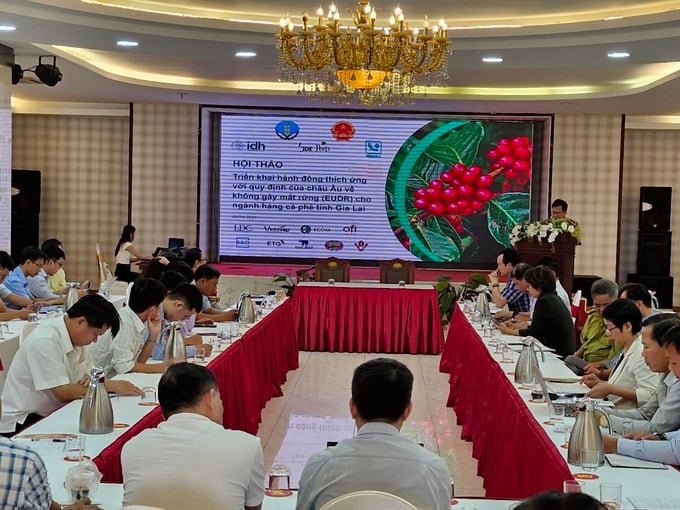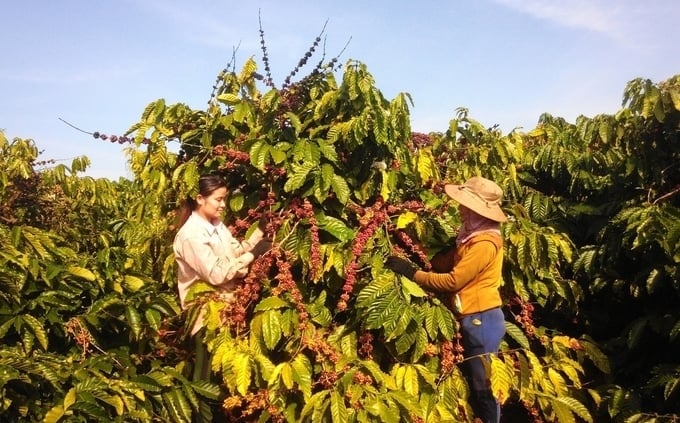May 29, 2025 | 19:27 GMT +7
May 29, 2025 | 19:27 GMT +7
Hotline: 0913.378.918
May 29, 2025 | 19:27 GMT +7
Hotline: 0913.378.918

Workshop on Implementing Action to adapt to EU Deforestation-free Regulation (EUDR) for the coffee industry in Gia Lai province. Photo: Dang Lam.
The Department of Agriculture and Rural Development of Gia Lai province has just coordinated with the Initiative for Sustainable Trade (IDH) to organize a "Workshop on Implementing Action to Adapt to EU Deforestation-free Regulation (EUDR) for the coffee Industry in Gia Lai Province".
The workshop was organized to implement an action plan framework to adapt to European regulations that do not cause deforestation, aiming to support the construction of production areas that do not cause deforestation, forest degradation, and sustainable agricultural production combined with the goals of preserving resources to ensure local social security, building a large-scale, sustainable coffee supply chain that does not cause deforestation and forest degradation, and responds to requirements of the market and the European Union in the period 2023 - 2030. This will help coffee suppliers adapt to the EUDR and avoid affecting the export of coffee products to the EU market, particularly global markets in general.
According to EUDR, the European Commission will ban the import of agricultural products whose production process on land originates from deforestation and causes forest degradation after December 31, 2020, including livestock farming, cocoa products, coffee, rubber, wood... The deadline to implement EUDR for large-scale enterprises is December 2024, and for small and medium-sized enterprises is June 2025.
According to Mr. Doan Ngoc Co, Deputy Director of the Department of Agriculture and Rural Development of Gia Lai province, agricultural products in Gia Lai province will face many challenges in meeting EUDR. The biggest challenge is proving that "relevant goods" or "related products" do not cause deforestation according to EUDR requirements. When related goods or products cannot be imported into the EU market, Vietnamese agricultural products and Gia Lai province will likely have their prices squeezed when exporting goods to countries requiring less compliance.

Gia Lai Coffee meets the EUDR. Photo: Dang Lam.
Gia Lai is mostly made up of people in mountainous, remote, and difficult areas whose lives depend on the forest, including ethnic minorities with different cultural, social, and traditional characteristics, habits, and customs if they are excluded from the commodity supply chain, with the practice of shifting cultivation from one place to another to clear and grow fields, it may continue to cause hot spots for forest destruction, forest land encroachment, and land disputes, especially those that have broken planning.
EUDR prohibits importing agricultural products whose production process on land originates from deforestation and forest degradation but also requires that those products comply with Vietnamese law, including land use rights certificates, labor usage, labor conditions for farmers and other labor-related regulations. Therefore, this is also a big challenge for the coffee industry in Gia Lai province.
Coffee is one of the main exported agricultural products of Gia Lai province. In 2023, 240,000 tons of coffee were exported, corresponding to an export turnover of USD 490 million, accounting for nearly 71% of the total export turnover of Gia Lai province. The implementation of EUDR will have many challenges, directly impacting small producers, indigenous people, as well as small and medium enterprises in Gia Lai province for the coffee industry.

Gia Lai aims to produce sustainable coffee. Photo: Dang Lam.
Regarding adaptation to EUDR, Gia Lai has many advantages such as: The entire Gia Lai province currently has about 37,538 hectares of coffee certified to VietGAP, 4C, Rainforest Alliance, and Organic standards. Coffee products are present in all provinces and cities in the country and have initially been exported to demanding markets such as the US, EU, Japan...
For the Gia Lai coffee industry in particular and the country in general to adapt to European regulations on not causing deforestation, representative of the Department of Forestry (Ministry of Agriculture and Rural Development), Dr. Nguyen Trong Cuong, has proposed specific solutions. In particular, a forest database must be established for EU use. Establish forest boundaries and forest developments to serve as a basis for industries to prove that products meet the requirements of not causing deforestation and to trace product origins. Develop forest maps, data, and production area maps according to the timeline prescribed by EUDR. In particular, the coffee industry needs to establish a product traceability system from farms to local agents.
Overcoming obstacles and difficulties to meet all stringent EUDR regulations to bring Gia Lai's agricultural products, including coffee products, to the most demanding markets in the world. Those are great efforts of the local government, the Agriculture and Rural Development sector, businesses, and farmers in Gia Lai province.
Translated by Huong Giang

(VAN) The mutual export of agrifood products between the European Union (EU) and the United Kingdom (UK) must occur again without certification, border controls or other red tape. This was agreed at the UK-EU summit.
/2025/05/22/5121-2-173645_677.jpg)
(VAN) NBSAP Tracker identifies strengths and areas for improvement in the National Biodiversity Strategy, based on each region’s priorities and capacities.

(VAN) The draft amendment to the Circular on rice export trading stipulates a periodic reporting regime for rice exporting enterprises.

(VAN) Dong Thap farmers attained an average profit margin of 64% during the summer-autumn 2024 crop (first season), while An Giang and Kien Giang farmers followed with 56% and 54%, respectively.

(VAN) As a doctoral student doing research on renewable energy and electrification at Harvard University, the author shares his musings on electricity, nature, and countryside memories.

(VAN) The decree on Extended Producer Responsibility (EPR) ensures transparent management and disbursement of support funds, avoiding the creation of a “give-and-take” mechanism.

(VAN) Hue City rigorously enforces regulations regarding marine fishing and resource exploitation, with a particular emphasis on the monitoring of fishing vessels to prevent illegal, unreported, and unregulated (IUU) fishing.